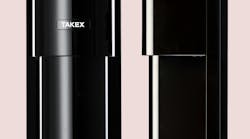MELVILLE, N.Y., Aug. 13, 2007 - Honeywell today announced the release of the 7845i-GSM, a unique new product combining Honeywell's popular GSM alarm radio with Internet service. The 7845i-GSM utilizes the Internet as the primary source of transmission and delivery of alarm signals-providing a fast, safe and affordable way to communicate.
Triple-path technology provides three paths of communication using the Internet, General Packet Radio Service (GPRS) and Short Message Service (SMS). Should the Internet become unavailable, the unit automatically communicates using the GSM network. This end-to-end communication platform enables dealers to expand services and increase the value of their accounts. Honeywell's GSM alarm communications radios are designed to meet the ever-changing needs of the future, expand the dealer's customer base and maintain and increase recurring monthly revenue (RMR).
Through the Internet or radio, the 7845i-GSM offers full data reporting and uploading/downloading with most Honeywell control panels. Plus, with zone inputs, it is compatible with other manufacturers' control panels. All 7845i-GSM radios are configured for Honeywell's new Total Connect remote services. Total Connect lets end-users remotely control their alarm systems via Honeywell's virtual keypad and stay connected to their homes or businesses remotely via the Internet, PDAs, cell phones, cameras and more.
Additionally, this end-to-end solution in combination with the AlarmNet backbone - the industry's premier wireless alarm communication network - will help dealers seamlessly transition customers to the latest digital technology. Current radios that use analog Advanced Mobile Phone Services (AMPS) networks are already being phased out due to the Federal Communication Commissions' (FCC) decision that permits cellular carriers to discontinue support to AMPS networks, known commonly as the "Sunset Clause."


